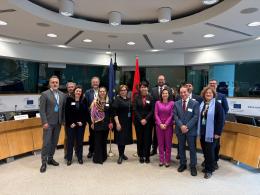European Economic
and Social Committee
Krajiny zapojené do procesu rozširovania
EHSV sa aktívne angažuje v procese rozširovania EÚ a vypracoval dvojaký prístup – regionálny a bilaterálny – pre vzťahy s organizáciami občianskej spoločnosti v krajinách zahrnutých do procesu rozširovania.
Pokiaľ ide o regionálny prístup, monitorovací výbor pre západný Balkán – stály vnútorný orgán EHSV – je hlavným nástrojom na koordináciu činnosti EHSV v tomto regióne. Fórum občianskej spoločnosti krajín západného Balkánu organizované každé dva roky je súčasťou činnosti monitorovacieho výboru.
EHSV pracuje aj na bilaterálnej úrovni s krajinami západného Balkánu a s Tureckom. Na základe asociačných dohôd medzi týmito krajinami a EÚ s cieľom zapojiť organizácie občianskej spoločnosti do predvstupového a prístupového procesu EHSV vytvoril tri spoločné orgány so zástupcami občianskej spoločnosti – s Tureckom, Čiernou Horou a Srbskom. Každý orgán sa skladá z rovnakého počtu členov z EHSV a partnerskej krajiny a stretáva sa dvakrát do roka.
EHSV udržiava pravidelné kontakty a organizuje spoločné činnosti s organizáciami občianskej spoločnosti v krajinách zahrnutých do procesu rozširovania, s ktorými dosiaľ nebol vytvorený žiadny spoločný orgán zástupcov občianskej spoločnosti.
Činnosť spoločných orgánov je sprevádzaná prípravou stanovísk EHSV o predvstupových a prístupových procesoch jednotlivých krajín, ako aj o témach regionálneho záujmu.

